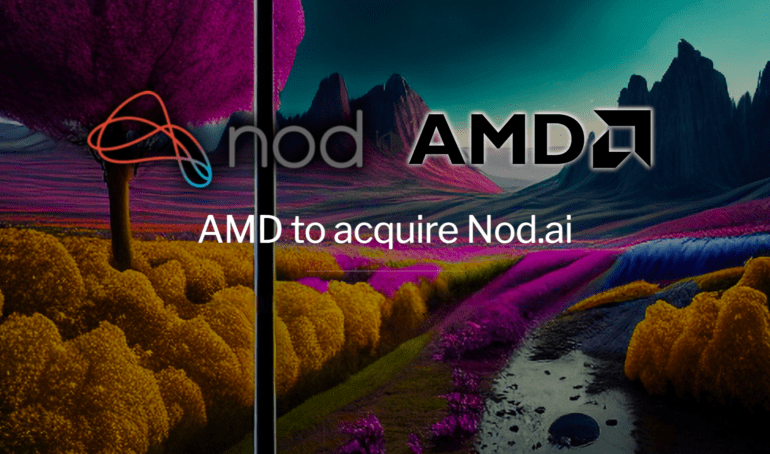TL;DR:
- Advanced Micro Devices (AMD) is acquiring Nod.ai, an AI software optimization startup.
- The move demonstrates AMD’s commitment to the growing AI chip market.
- Nod.ai specializes in open-source AI software development.
- The acquisition aligns with AMD’s strategy of fostering an open software ecosystem for AI.
- Nod.ai’s expertise lies in advanced compiler-based AI approaches.
- AMD aims to simplify AI model deployment on its hardware through this acquisition.
- AMD has been investing heavily in AI technologies to compete with Nvidia and Intel.
- The global AI market is projected to reach $594 billion by 2032.
- AMD plans to leverage Nod.ai’s engineering talent to enhance its open-source developer presence.
Main AI News:
In a strategic move to strengthen its presence in the burgeoning AI chip market, Advanced Micro Devices (AMD) has announced its acquisition of Nod.ai, an innovative startup specializing in optimizing AI software for high-performance hardware. The acquisition underscores AMD’s commitment to capitalizing on the rapid growth of the AI sector, which industry analysts predict will reach a staggering $383.7 billion by 2032.
Founded just three years ago, Nod.ai has quickly risen to prominence as a pioneer in open-source AI software development. This purchase solidifies AMD’s growth strategy, centered on fostering an open software ecosystem that streamlines the adoption process for its customers. Through developer tools, libraries, and models, AMD aims to provide a seamless path for organizations seeking to harness the power of AI.
Nod.ai’s expertise lies in advanced compiler-based approaches, a departure from traditional handwritten kernels. The company has successfully developed the SHARK Machine Learning Distribution, built on the foundation of LLVM, MLIR, OpenXLA’s IREE, and Nod.ai’s unique tuning. This software innovation empowers organizations to expedite the deployment of AI models across a wide spectrum of platforms utilizing AMD’s cutting-edge architectures, including Instinct data center accelerators, Ryzen AI processors, EPYC processors, Versal SoCs, and Radeon GPUs.
This strategic acquisition is expected to substantially augment AMD’s ability to provide AI customers with open software solutions, facilitating the effortless deployment of highly performant AI models finely tuned for AMD hardware. Vamsi Boppana, Senior Vice President of the Artificial Intelligence Group at AMD, expressed his enthusiasm for the acquisition, stating, “The acquisition of Nod.ai is expected to significantly enhance our ability to provide AI customers with open software that allows them to easily deploy highly performant AI models tuned for AMD hardware.“
AMD’s pursuit of AI excellence has seen substantial investments in recent years, with the development of CDNA, XDNA, RDNA, and Zen architectures. These efforts are aimed at solidifying AMD’s position in the rapidly expanding AI market, where it competes head-to-head with industry giants like Nvidia and Intel. Projections estimate the global AI market size to approach $594 billion by 2032.
Beyond the technological advantages, AMD plans to leverage the engineering talent acquired from Nod.ai to bolster its standing in the open-source developer community. Nod.ai has been a vital contributor to AI software repositories, including SHARK and Torch-MLIR, which are widely utilized by researchers and developers alike.
Conclusion:
AMD’s acquisition of Nod.ai represents a strategic move that aligns with the company’s vision of becoming a prominent player in the AI chip market. By embracing open-source software and harnessing the capabilities of Nod.ai’s technology and talent, AMD is poised to offer its customers innovative AI solutions that are optimized for its hardware, solidifying its position in the ever-evolving AI industry.

